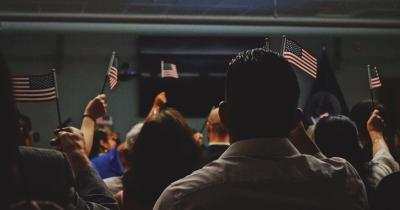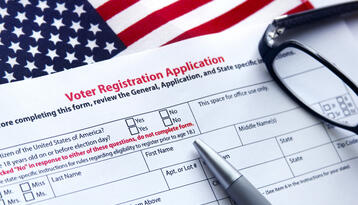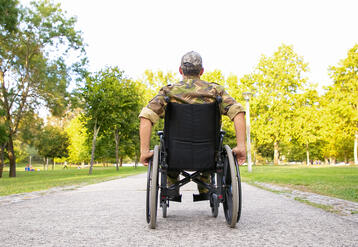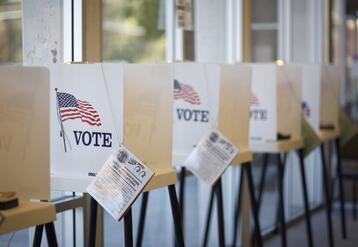
Extending the Hand of Democracy
How U.S. Citizenship and Immigration Services (USCIS) can assist thousands of New Americans to register to vote.

Many people don’t realize that an obstacle to voting is the seemingly simple act of registering to vote—but it is.
Many people don’t realize that an obstacle to voting is the seemingly simple act of registering to vote—but it is. In the United States, only 73 percent of eligible voters are registered to vote, meaning millions of people are unable to make their voices heard election after election.
This required step of registering to vote is a burden put on the voter, and is a vestige from the 19th century system designed in part to keep immigrants from voting at a time when non-citizens could vote. This is why the U.S. Citizenship and Immigration Services (USCIS)—the agency responsible for processing citizenship applications as well as other forms of immigration services—should do everything in its power to repair this history and help eligible voters register to vote as soon as they are naturalized.
For decades the NVRA, or National Voter Registration Act, has been part of the government engine helping to provide millions of voters the opportunity to register to vote in a simple, safe, and nonpartisan manner. If you have ever registered to vote through the Department of Motor Vehicles, you have experienced the ease of this opportunity and benefited from the NVRA. Yet the full power of the NVRA to strengthen American democracy is not yet realized.
USCIS could substantially improve its voter registration opportunities by offering them at every naturalization ceremony the agency oversees for the several hundreds of thousands of newly naturalized citizens each year.
President Biden’s Executive Order on Promoting Access to Voting (EO) supports the expansion of registration services to federal agencies such as USCIS. The EO is a step in the right direction and encourages agencies to fully realize the potential of the NVRA—which always intended for federal agencies to register voters, too—by encouraging them to provide voter registration opportunities in their everyday interactions with the eligible communities they serve. Under the EO, USCIS could substantially improve its voter registration opportunities by offering them at every naturalization ceremony the agency oversees for the several hundreds of thousands of newly naturalized citizens each year.
I am a beneficiary of USCIS’ current system of offering voter registration opportunities after naturalization. On July 29, 1999, I became a U.S. citizen. After my oath ceremony, I was offered and accepted the opportunity to fill out a voter registration card. The next day, my registration became valid, and I became an eligible voter.
But not every new citizen has this opportunity. USCIS’s voter registration opportunities are not provided at every naturalization ceremony. Election officials and nonpartisan NGOs are not always available to conduct voter registration, and in some cases are not invited. USCIS is also not required to offer voter registration at judicial naturalization ceremonies, meaning new citizens may receive no registration opportunities at all.
As an attorney with firsthand experience working with immigrants applying for immigration status, I have seen the powerful example of government officials extending the hand of our democratic system to immigrants. USCIS offering high quality voter registration services at all naturalization ceremonies could result in thousands of new eligible voters every year and help the agency meet its mission of “uphold[ing] America’s promise as a nation of welcome and possibility with fairness, integrity, and respect for all we serve.”
This suppression is not new.
This opportunity is urgent. Currently, there are laws in Arizona creating obstacles for naturalized citizens like me to vote. In South Carolina there is a new law automatically removing voters without notice for suspected non-citizenship. This suppression is not new. The Civil Rights Movement began in part because of insidious voting law changes enacted in states like Georgia, Alabama, and Mississippi with the express purpose of blocking the right to vote for tens of thousands of Black voters. In a country that depends on her citizenry to fully exercise the critical muscle to form a truly representative democracy, it is vitally important to modernize the infrastructure of our democracy so it works for all the people.
President Biden’s EO offers significant opportunities to do just that. USCIS can do their part by improving voter registration services at administrative naturalization ceremonies and extending those voter registration services to judicial ceremonies as well. The moment to act is now. Let us all rise up to meet the call.






